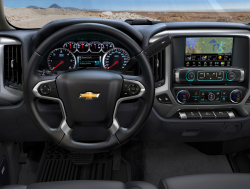
— A GM airbag recall of about 7 million vehicles worldwide will eventually be announced, with 5.9 million of the following models on the U.S. list.
- 2007–2014 Chevrolet Silverado 1500 / Silverado 2500 / Silverado 3500
- 2007–2014 GMC Sierra 1500 / Sierra 2500 / Sierra 3500
- 2007–2014 Chevrolet Tahoe
- 2007–2014 Chevrolet Suburban
- 2007–2014 Chevrolet Avalanche
- 2007–2014 GMC Yukon
- 2007–2014 GMC Yukon XL
- 2007–2014 Cadillac Escalade
- 2007–2014 Cadillac Escalade ESV
- 2007–2014 Cadillac Escalade EXT
The GM airbag recall in the U.S. will soon be announced after the automaker filed four petitions with the government in an effort to convince safety regulators that a recall of millions of vehicles isn't necessary.
General Motors claims the Takata airbag inflators are safe and likely won't explode, a claim the automaker made in 2016 when it announced a "preliminary recall" of 1.9 million vehicles.
GM filed its first petition with the National Highway Traffic Safety Administration (NHTSA) by arguing the alleged airbag defects were "inconsequential" to safety. NHTSA continued to delay its decision by allowing GM repeated attempts to prove its case.
The automaker filed four petitions with the government since 2016 by claiming there are multiple unique differences between the Takata airbag inflators that have exploded and the inflators in the GM vehicles.
Additionally, GM says the airbag recall isn't necessary because the vehicle interiors “better protects the front-passenger inflator from the extreme temperature cycling that can cause inflator rupture.”
Over the past four years, General Motors collected Takata airbag inflators from vehicles involved in crashes and conducted ballistic tests on more than 4,200 inflators. The majority of those inflators came from Zone A areas, designated as states where high temperatures and humidity are common.
According to GM, an airbag recall is a waste of time because none of the tested inflators exploded. The automaker also performed CT scans of more than 1,500 inflators and concluded, “even the oldest (MY 2007) Zone A Takata GMT 900 inflators are not at risk of rupture.”
Documents filed with NHTSA indicate the above GM vehicles have been involved in nearly 67,000 crashes where the passenger airbags deployed. But GM says none of the inflators ruptured and all of the Takata airbags worked exactly as designed.
The GM Airbag Recall Petitions: Denied
In its decision to deny GM's four "inconsequential defect" petitions, NHTSA references the Cambridge Dictionary which defines “inconsequential” to mean “not important” or “able to be ignored.”
While GM's arguments appeared sound, NHTSA brought in an outside airbag expert who holds 25 airbag patents. Harold Blomquist reviewed GM's petition documents and determined the Takata airbag inflators were similar to the same inflators that have killed at least 30 people worldwide.
The chemical airbag expert found nothing inconsequential about leaving the current Takata airbag inflators installed in 7 million vehicles.
NHTSA also says GM focuses on the alleged claim the Takata airbag inflators aren't at risk of exploding by alleging the subject inflators are “more resilient” than other Takata inflators. But NHTSA found the automaker doesn't focus on the consequences to vehicle occupants if the inflators rupture.
"Based upon this information, and applying its expert judgment as the Agency charged with overseeing motor vehicle safety, NHTSA has determined that GM has not demonstrated that the defect is inconsequential to safety in the GMT900 vehicles." - NHTSA
GM says it will abide by NHTSA's decision, something that will cost the automaker about $1.2 billion.




